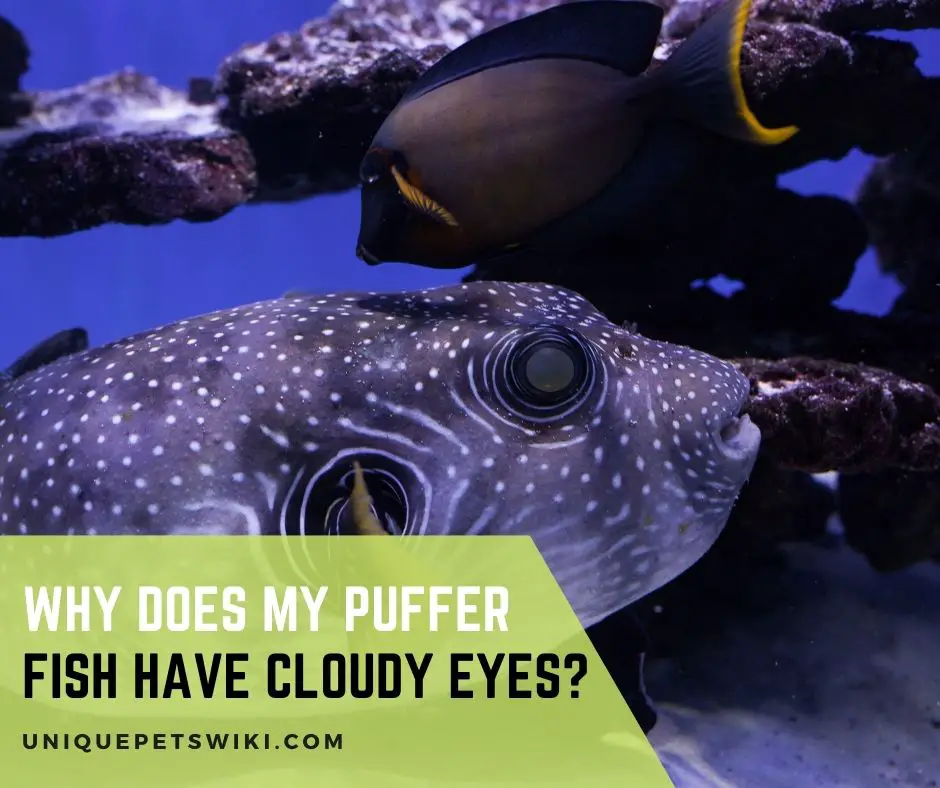If you have been wondering “why does my puffer fish have cloudy eyes”, there may be numerous reasons for it.
Some fish are more susceptible to eye issues and pufferfish are one of them. This is mainly due to their bulging and wide-set eyes which also happen to be one of their distinguishing features.
In this guide, we will discover the reasons why puffer fish may have cloudy eyes and what you can do to treat and prevent it.
Contents
Do Puffer Fish Go Blind?
Yes, there are several forums where people have discussed their puffer fish going blind.
It starts with the fish’s eyes glazing over and suddenly the pet is unable to see. It may not swim towards its food unless you place it right in front of its mouth. It might also swim erratically or not at all.
A major sign of blindness in fish is that their eyes appear cloudy and dull. They might also bump into objects or plants placed in the tank.
A puffer fish with healthy eyes will have bright, shiny, and bulging eyes. There will be no dull cloudiness, red blotches, or white layer upon them. The eyes will not be sunken in their sockets.
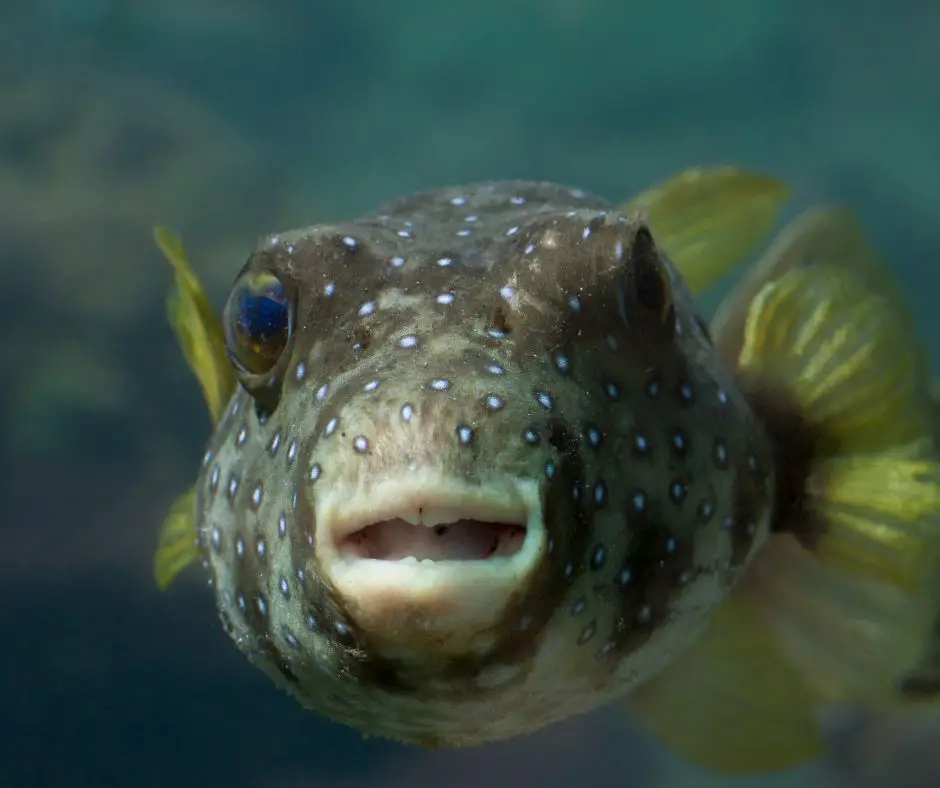
Do cloudy eyes cause blindness in puffer fish?
Depending on the cause of cloudy eyes, your puffer fish may or may not go blind.
However, if your pet is diagnosed with a cataract or a serious eye infection, or the extent of damage to its eyes seems irreversible, then there is a chance that it may go blind over time.
Why Does My Puffer Fish Have Cloudy Eyes?
There are several reasons why a puffer fish may develop whitish or cloudy eyes. One of the main reasons is poor water parameters. Infections and injuries are also contributing factors.
Similarly, natural aging, cataracts, and poor diet may also result in puffer fish having cloudy eyes.
Let us take a look at each of the causes in detail.
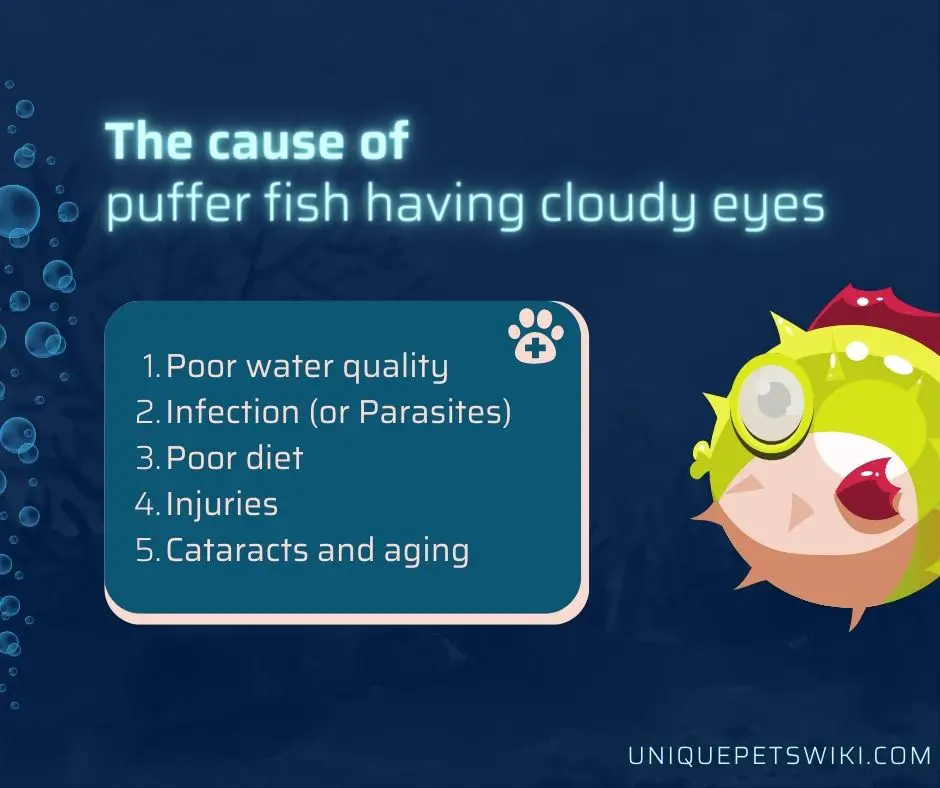
Poor water quality
Poor water quality is one of the major causes of ill-health in pufferfish.
Other signs
Poor water conditions can cause various signs of ill-health in puffer fish such as stress, burn marks or black lesions on its body, entire body turning dull or black, lack of appetite, lethargy, etc.
Your fish might also come up to the water’s surface frequently, puff up, or display inactivity and lethargy.
Causes
Causes of poor water quality are inadequate water testing, lack of use of a filter, inadequate cleaning of the tank, and infrequent water changes. All these factors lead to stress and ill-health in fish.
You must test your tank water from time to time. Check the levels of ammonia, nitrates, and nitrites. Also check the water pH, salinity, and temperature.
If you are overfeeding your fish or have plants in the tank, they may be responsible for higher-than-normal levels of ammonia.
Different species of puffer fish need different salinity and pH. Research your species carefully and provide it with the optimum environment it needs.
How to treat
The best way to treat poor water quality is to use a filter. You also need to make 50-70% water changes every 2-3 days.
Recovery ability
The recovery will depend upon the extent of damage caused to your fish’s eyes by the poor environment. Products like MELAFIX claim to repair cloudy eyes in fish.
You can try it out but always check with your vet before using such products.
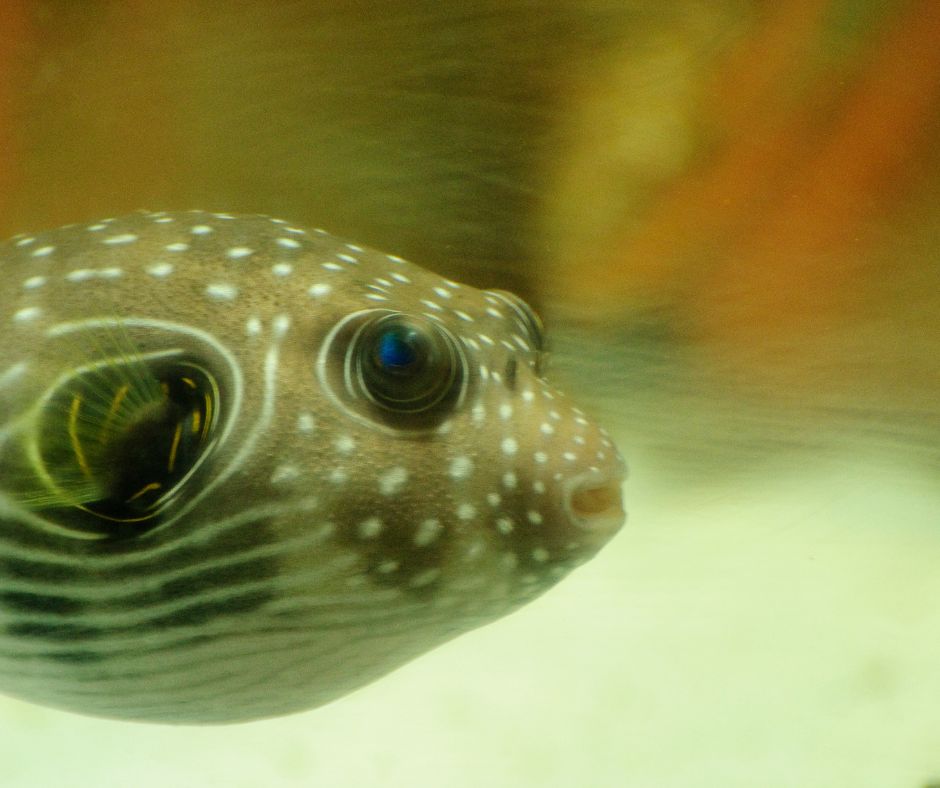
Infection (or Parasites)
Pufferfish can suffer from various infections in the tank. Streptococcus bacteria are mostly to blame for cloudy eye infections in freshwater and marine puffer fish.
However, microbes like fungi, viruses, etc too could result in cloudy secretions on the lens of the eye. A parasite called Ichthyophthirius multifiliis or Ich can also result in cloudy or opaque eyes in fish.
Signs of infections
The exact signs will depend on the type/cause of infection. Watery eyes, redness, sunken eyes, and scarring are some other symptoms of eye infections.
A fish infected by bacteria or parasites could also suffer from other symptoms like skin sores, bumpy growths or lesions on the skin, odd swimming patterns or not swimming at all, turning black or dull in appearance, etc.
Causes
Viruses, bacteria, protozoa, fungi, and metazoa can cause various infections in puffer fish. These too could result in cloudy eyes as one of the symptoms.
How to treat it
Treatment will depend on the causative elements. For bacterial infections, your aquatic vet might recommend antibiotics.
S/he may ask for bacterial culture and sensitivity testing to identify the exact cause and recommend the right treatment.
Recovery ability
Again, your fish’s recovery will depend upon the extent of the damage. Some infections are untreatable. Others may need a lot of aggressive treatment.
Poor Diet
Poor diets and nutritional imbalances are some of the most common reasons behind sickness and death in captive puffer fish. An inadequate or imbalanced diet won’t provide adequate nutrients to your fish.
It will be in a deficit in vitamins and minerals needed for healthy pufferfish eyes.
Other signs
- Your fish won’t appear to be thriving.
- It might swim erratically or appear lethargic.
- It might appear pale or dull.
- Your fish could lose weight and appear skinny.
Causes
- Infected live food
- Stale or spoilt food, improperly stored food, and feed toxicity
- Your pet is picky and does not eat well
- Soft fish food also contains an enzyme called thiaminases which could destroy vitamin B in the pufferfish’s body. This can affect your pet’s eyesight and eyes.
How to treat it
Make sure you store the food properly and take measures to prevent it from spoiling. Consult an aquatic vet to ensure feeding the best food to your puffer fish.
If your pet is picky in its eating habits, you may want to try new brands of flavors that get it to eat.
Recovery ability
The recovery will depend on the extent of damage inflicted. Your vet will help confirm the exact cause of the nutritional deficiency. In the meantime, replace your pet’s diet with a new one.
Injuries
Popeye disease is a common injury seen in captive fish.
Causes
Eye injuries like popeye disease occur when your fish scrapes its bulging eye against an abrasive object (sharp gravel or rocks) in the tank.
Other causes include trauma caused by fighting between tank mates. Poor handling by humans can also be a cause of traumatic injury in fish.
Other signs
Signs of eye injuries include protrusion or eyeball, stretching of the eye socket, discoloration of eyes, cloudy eyes, loss of appetite, swollen body, etc.
the fish might be unable to see properly and may bump into objects. This can worsen eye injuries.
How to treat it
Usually, minor eye injuries heal on their own. Your vet will suggest the right medication and you can use aquarium salt during its recovery phase to help your pufferfish heal faster. (Do make sure to check with the vet before using it.)
API AQUARIUM SALT Freshwater Aquarium Salt 65-Ounce Box
- Contains one (1) API AQUARIUM SALT Freshwater Aquarium Salt 65-Ounce Box
- Promotes fish health and disease recovery with increased electrolytes
- Improves respiration for fish in freshwater aquariums
- Made from evaporated sea water for all-natural results
- Use when changing water, when setting up a new freshwater aquarium and when treating fish disease
Last update on 2022-12-29 / Affiliate links / Images from Amazon Product Advertising API
Recovery ability
With medicines and good nutrition, most minor injuries can heal. Severe trauma with dislocated eyeball may be irreversible.
Cataracts and Aging
Like in humans, cataracts and normal aging can cause the eye lens to become opaque.
Causes
Factors like aging, poor diet, improper water parameters, genetics, and infections can all lead to cataracts in puffer fish. Aging results in weakened immunity so the fish is unable to fight minor infections. This makes it susceptible to illnesses and cloudy eyes.
Other signs
In the initial stages of the disease, you might see white spots forming on the eye lens. As the disease progresses, the entire lens might become cloudy. You might also see white halos on the lens.
How to treat it
There is no treatment for cataracts caused by natural aging or genetics in fish.
Recovery ability
Only fish cataracts that are osmotically induced due to poor water conditions can be reversed once the water parameters are fixed.
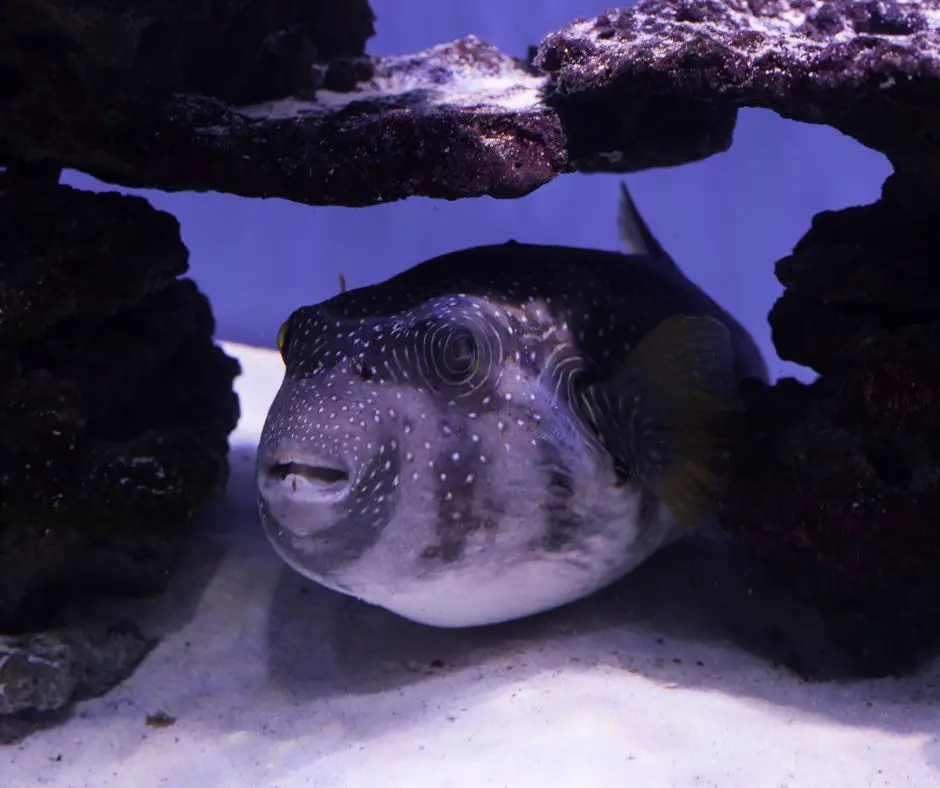
Should I Be Worried About Cloudy Eyes In Puffer Fish?
As can be seen, some cases of puffer fish cloudy eyes are treatable. Most pufferfish will heal themselves from the cloudy eyes and you need not do anything about it.
You may want to discuss steps you can take to facilitate the healing of your pet with an experienced vet.
The addition of water conditioners, aquarium salts, etc. could help to some extent since they relieve stress in fish and are beneficial when combined with medicinal baths or dips.
However, for many conditions, such remedies are contraindicated so make sure to always check with your vet prior to adding any chemicals to the tank.
Some serious cases of cloudy eyes are irreversible and may even end up killing your puffer.
How Do You Treat Cloudy Eyes In Fish?
The treatment of cloudy eyes in puffer fish will depend on the causative factor. Here are some steps you can take once you discover your pufferfish with cloudy eyes:
Eye drops – There are eye drops that claim to treat cloudy eyes in fish. However, they are not effective since the drops will come off as soon your fish swims away.
The application of eye drops is also tedious, especially for a delicate species such as puffer fish.
Providing optimum environment – the best thing you can do is test the water frequently, make water changes, or use a water filter. You need to maintain optimum pH and water parameters like ammonia, nitrates, and nitrites.
Remove abrasive or sharp objects from the tank – this is important to minimize collisions and traumatic eye injuries.
Improve your pet’s diet – select the right food and make sure you store it properly. Discard expired or contaminated food right away.
Ensure there is no fighting among fish – provide a large tank and ensure that there is no fighting among the tank mates.
Add water conditioner or aquarium salt – Some vets recommend these as a part of cloudy eye treatment. These medicines facilitate healing and are known to improve results when used with appropriate treatment.
API FRESHWATER MASTER TEST KIT 800
- Contains one (1) API FRESHWATER MASTER TEST KIT 800-Test Freshwater Aquarium Water Master Test Kit, including 7 bottles of testing solutions, 1 color card and 4 glass tubes with cap
- Helps monitor water quality and prevent invisible water problems that can be harmful to fish and cause fish loss
- Accurately monitors 5 most vital water parameters levels in freshwater aquariums: pH, high range pH, ammonia, nitrite, nitrate
- Designed for use in freshwater aquariums only
- Use for weekly monitoring and when water or fish problems appear
Last update on 2022-12-30 / Affiliate links / Images from Amazon Product Advertising API
Conclusion – Why Does My Puffer Fish Have Cloudy Eyes?
Many factors can cause cloudy eyes in puffer fish: poor environment, infection, imbalance in its diet, or injuries or trauma. Please test the water and make changes or consult your vet for further treatment.
We hope this guide helps you find the right treatment for your puffer fish’s cloudy eyes.
